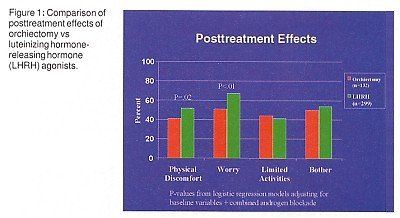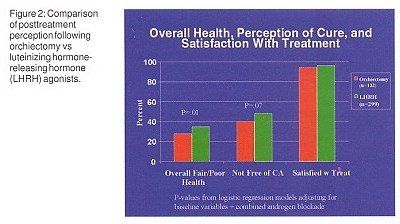Primary Androgen Therapies Yield Similar Results, Different Perceptions
SAN FRANCISCO-A comparison of quality-of-life measures reported by patients in the Prostate Cancer Outcomes Study (PCOS) found that men who underwent orchiectomy felt better and worried less about their health than men who received luteinizing hormone-releasing hormone (LHRH) agonists.
SAN FRANCISCOA comparison of quality-of-life measures reported by patients in the Prostate Cancer Outcomes Study (PCOS) found that men who underwent orchiectomy felt better and worried less about their health than men who received luteinizing hormone-releasing hormone (LHRH) agonists.
Kevin B. Knopf, MD, MPH, presented results of the National Cancer Institute study of 431 men who underwent primary androgen deprivation therapy while participating in PCOS. The researchers found orchiectomy and LHRH patients had equivalent health outcomes for urinary, bowel, and sexual function. For example, 85.1% of orchiectomy patients and 83.9% of the LHRH patients reported posttreatment impotence.
Nonetheless, the LHRH patients reported more physical discomfort than the orchiectomy patients, in particular breast swelling, 24.9% vs 9.7%, and were more likely to rate their health as fair or poor: 35.4% vs 28.1%. (See Figures 1 and 2.)


"Both groups felt satisfied with their treatment, although the men who received LHRH agonists tended to have more worry and distress overall about their cancer and were less likely to perceive themselves as being free of prostate cancer," said Dr. Knopf. Now at the Annapolis Cancer Center in Maryland, at the time of the study he was an oncology and research fellow in the applied research program at NCI, where he collaborated with health services researcher Arnold L. Potosky, PhD.
High Risk of Progression
The patients in the study came from six geographic regions. More than half were initially diagnosed with localized prostate cancer. About one third of the men had metastatic disease, according to Dr. Knopf.
"The prevalence of androgen deprivation therapy was higher in localized prostate cancer than one would have thought," he said, noting that it is not indicated as the primary treatment for localized disease. If the numbers reflect its use nationwide, Dr. Knopf estimated that 22,000 men in America could be receiving primary androgen therapy for localized prostate cancer.
All told, 3,486 men diagnosed with primary invasive prostate cancer from October 1, 1994, through October 31, 1995, participated in PCOS. Of these, 2,350 men received androgen deprivation therapy in addition to radiation or surgery and 714 men had radiation or surgery without any androgen therapy, according to Dr. Knopf. Another subset of 45 men who received oral monotherapy was too small to be included, he said.
The researchers analyzed questionnaires sent at 6, 12, and 24 months after diagnosis to the remaining 431 men who only received hormone therapy. Dr. Knopf used the 12-month data in his presentation, noting that it was virtually identical to the 24-month data.
He reported that LHRH was more common than orchiectomy, 299 patients vs 132, in this cohort. At baseline LHRH patients were better educated and wealthier, with a larger proportion of incomes above $30,000: 35% vs 21%. Orchiectomy patients were more likely to have obstruction, 61% vs 44%. The median age for both groups was 73, and their sexual function was similar at baseline.
More Into Denial?
In discussing the study, Mark S. Litwin, MD, MPH, of the University of California, Los Angeles, suggested that the researchers might have identified underlying differences between patients in the two groups rather than in the effects of the treatments. "It may be that orchiectomy patients are more into denial and don’t really want to think about their disease," he said. "It may be that LHRH patients end up being more the worrywarts, if you will. They may end up getting more PSAs measured. It may be that the patients who undergo orchiectomy may find it easier to just carry on with their lives and not think about things."
Dr. Knopf said he could not explain why the LHRH patients worried more about their health, but he offered a hypothesis. "Men who chose shots may have been more cognizant of the disease from the start," he said, adding that they might be more concerned about their disease because they went to the doctor’s office more often for their treatment.
Prolaris in Practice: Guiding ADT Benefits, Clinical Application, and Expert Insights From ACRO 2025
April 15th 2025Steven E. Finkelstein, MD, DABR, FACRO discuses how Prolaris distinguishes itself from other genomic biomarker platforms by providing uniquely actionable clinical information that quantifies the absolute benefit of androgen deprivation therapy when added to radiation therapy, offering clinicians a more precise tool for personalizing prostate cancer treatment strategies.